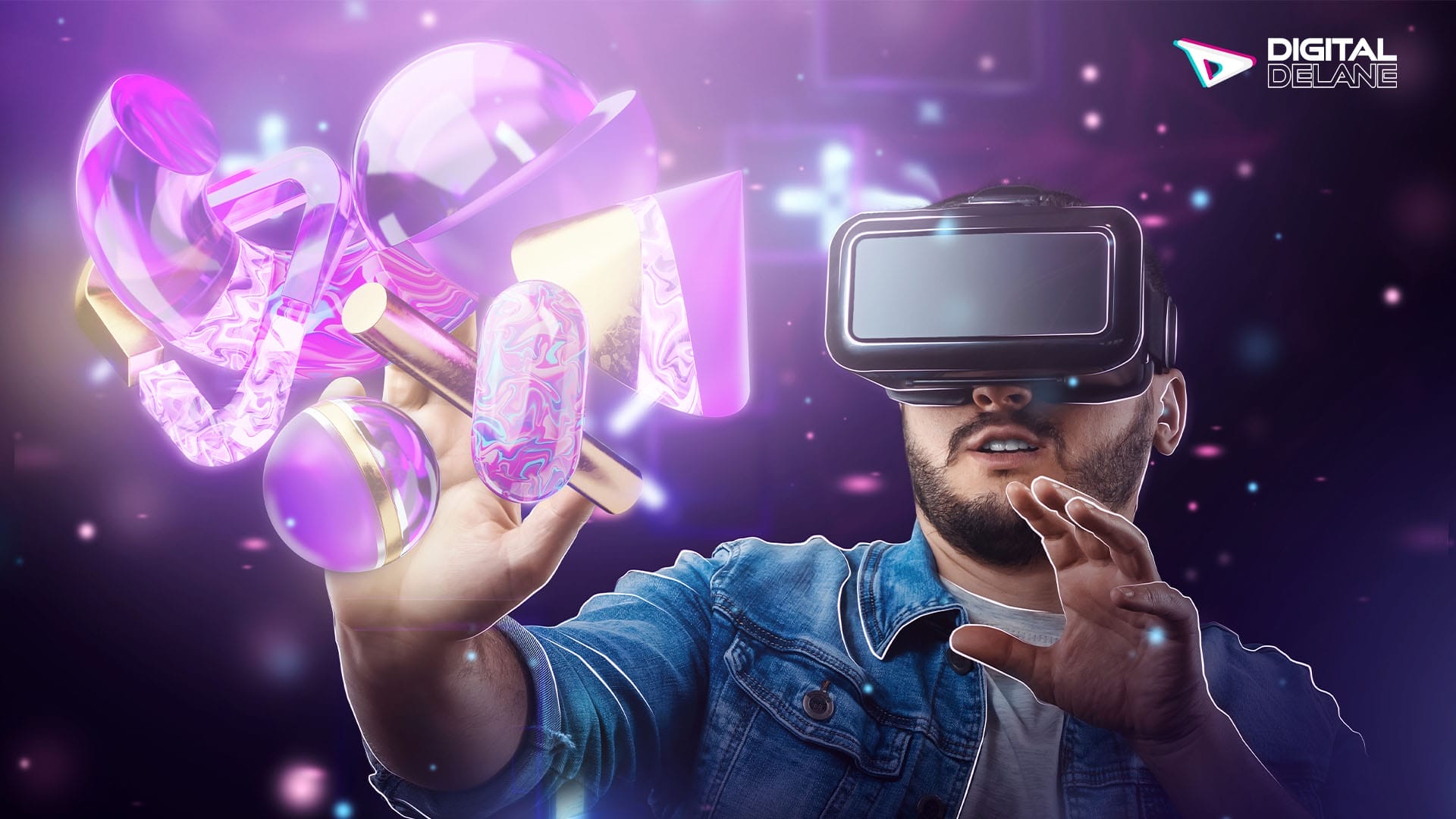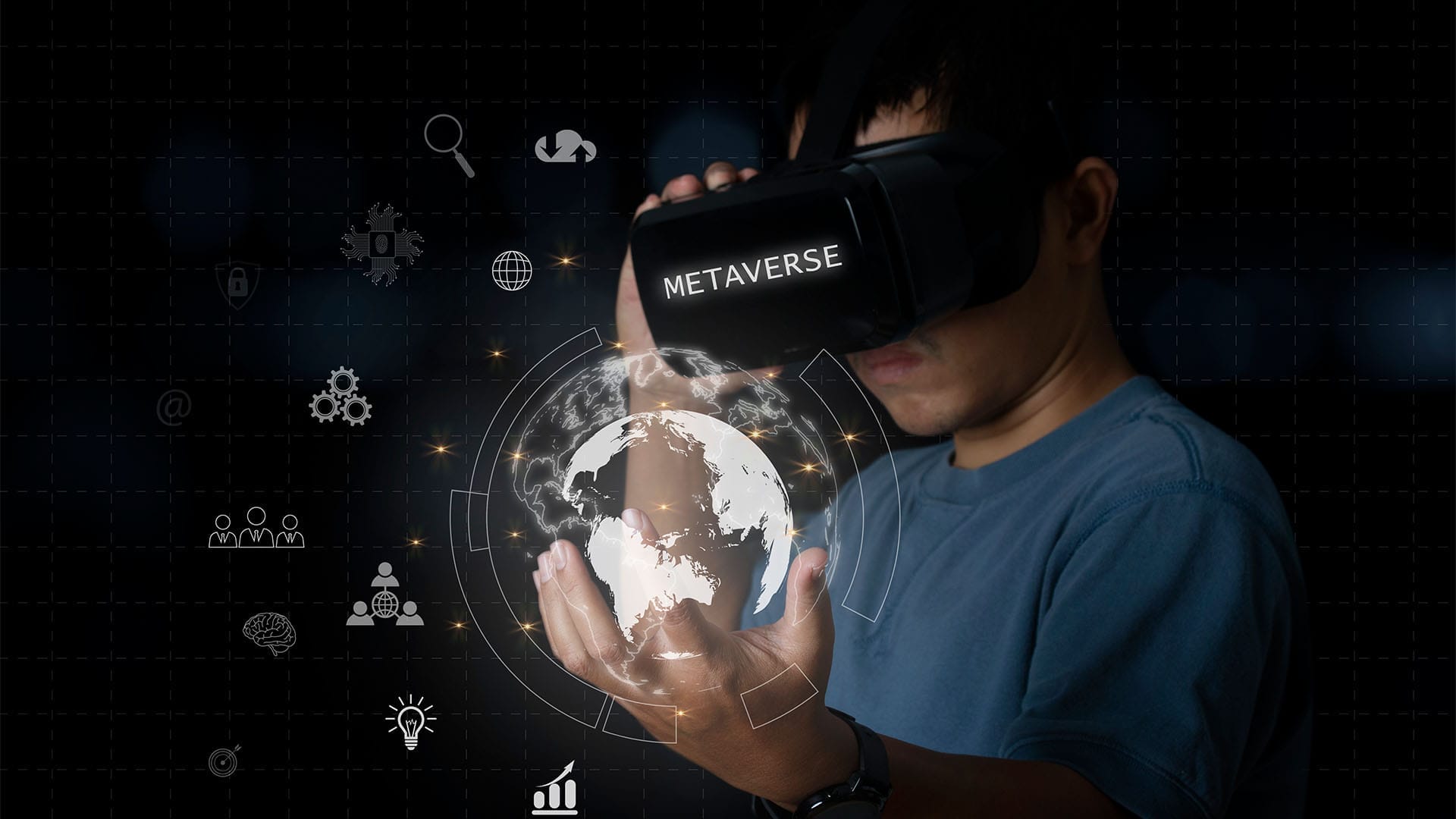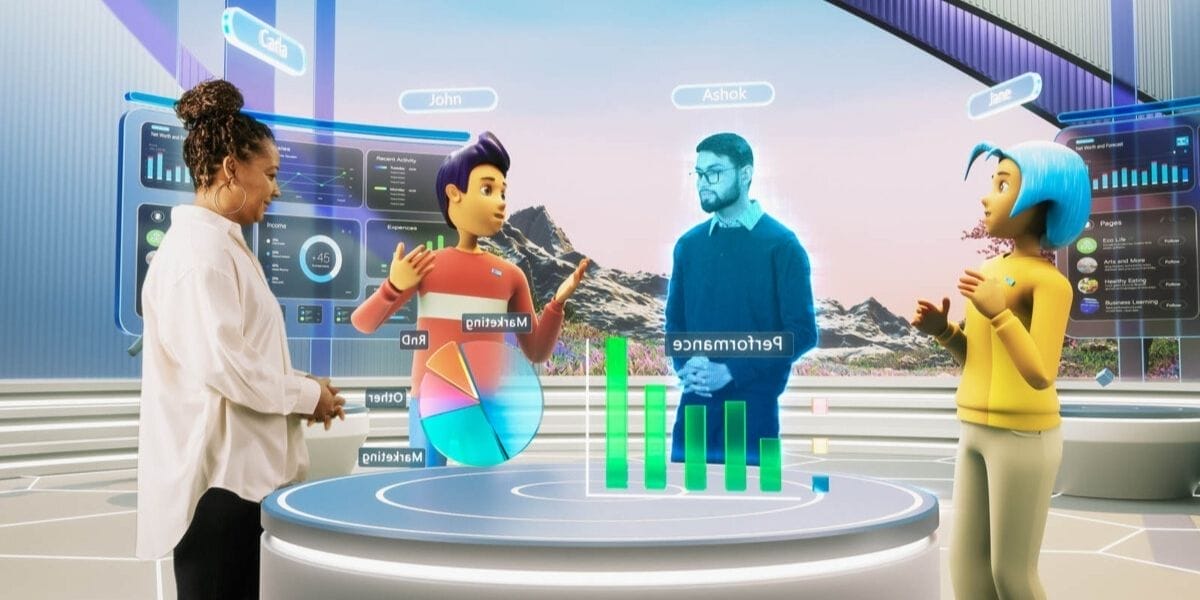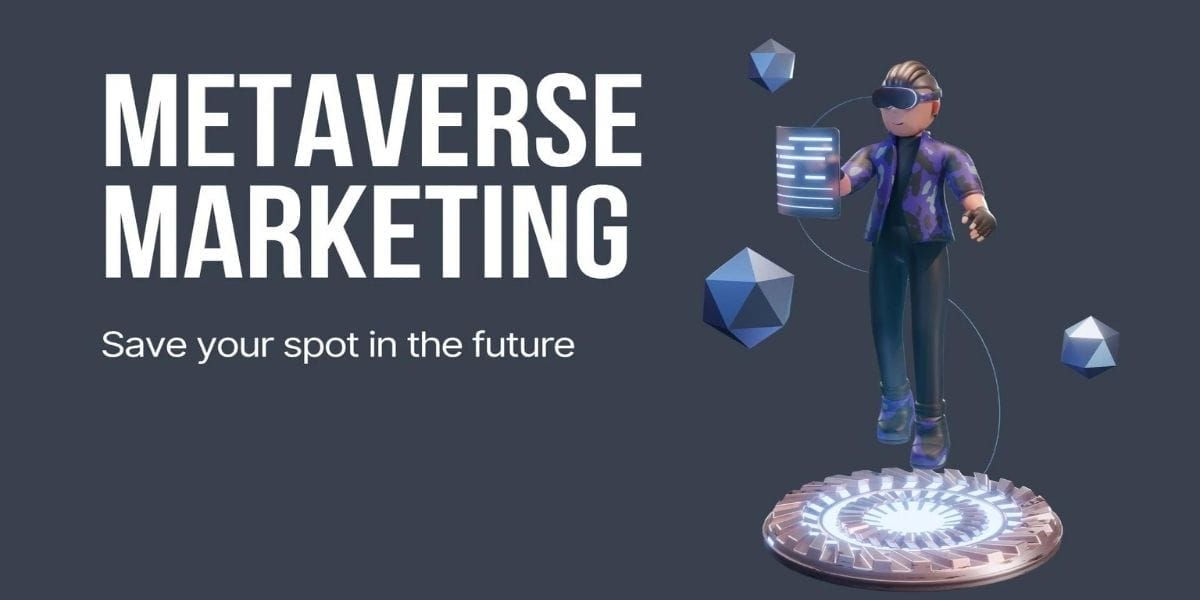Metaverse Marketing to Promote Your Business

In today’s rapidly evolving digital landscape, businesses are constantly looking for innovative ways to stay ahead of the competition and reach their target audience. One powerful strategy that is gaining traction is metaverse marketing.
The metaverse refers to a virtual reality space that is created by the convergence of physical and virtual worlds. It encompasses a vast array of digital platforms, ranging from virtual reality games to social media networks, where users can interact with each other and the virtual environment of marketing campaigns. With the growing popularity of these immersive experiences, marketers are recognizing the potential of leveraging the metaverse to promote their businesses.
Metaverse marketing offers a unique opportunity to create a highly engaging and personalized customer experience. By immersing users in a virtual world, brands can showcase their products or services in a more interactive and captivating manner. Additionally, the metaverse allows for a deeper level of customer interaction, as users can actively participate in virtual events, attend product launches, or even explore virtual showrooms. With its ability to transcend physical boundaries, metaverse marketing has the potential to reach a global audience and drive significant brand exposure.
What is metaverse marketing?
Metaverse marketing is promoting products or services in a virtual reality world. The goal is to create an immersive experience that encourages users to take action. Businesses create virtual experiences or environments for users to interact with their products or services. Augmented and virtual reality are leveraged to develop impactful marketing campaigns. Collaboration with metaverse influencers can increase engagement and reach. Metaverse marketing is a unique opportunity to connect with customers and create immersive experiences.
Why is metaverse marketing important?
Metaverse marketing is crucial for brands as it offers a new and vast audience to target. With millions of active users on platforms like Roblox and Fortnite, it provides a unique opportunity to connect with a highly engaged audience, build brand loyalty, and drive sales.


Here’s why metaverse marketing is essential:
1. Access to a large and committed audience
2. Increased brand visibility and awareness
3. Enhanced brand experience and immersion
4. Development of brand communities
5. Innovation and staying ahead of the curve
Metaverse marketing opens up exciting opportunities for brands to connect with a vast and engaged audience in a unique and immersive way. By leveraging the metaverse’s potential, brands can enhance visibility, create memorable experiences, build strong relationships, reach their marketing goals, and drive business growth.
Types of metaverse marketing


Virtual events
Virtual events are a popular form of metaverse marketing. These events take place in a virtual space where participants can interact with each other and with virtual content. Various types of virtual events can be used for marketing purposes, such as conferences, trade shows, product launches, and workshops. These events provide a unique and immersive experience for participants, allowing them to engage with a brand or product in a virtual environment.


Virtual events also offer opportunities for networking and collaboration among participants, making them an effective marketing tool in the metaverse.
Here are some benefits of using virtual events for metaverse marketing:
1. Increased reach
2. Immersive brand experience
3. Enhanced interactivity
4. Cost-effectiveness
5. Data and analytics
6. Flexibility and scalability
Incorporating virtual events into metaverse marketing strategies allows brands to leverage cutting-edge technology to engage with their audience in novel ways, creating a buzz, generating brand awareness, and driving customer loyalty and brand growth.
Virtual stores


Virtual stores in the metaverse offer an immersive shopping experience. Users can browse and purchase products, customize avatars, and interact with other shoppers. The stores are accessible through VR headsets or other devices, providing a realistic and interactive experience. Users can browse various products, view detailed descriptions, and read reviews. They can also enjoy social features, chat with friends, and share recommendations. Virtual stores in the metaverse offer convenience as users can shop anytime, anywhere, and make secure online payments.
Virtual sponsorships


Virtual sponsorships enable brands to collaborate with metaverse platforms or influencers and reach a larger audience. By partnering with metaverse influencers, brands gain credibility and tap into their influence. Virtual sponsorships provide a more immersive way to engage with target audiences and offer data-driven insights. Overall, virtual sponsorships offer brands a unique opportunity to connect with a growing audience within the metaverse.
Non-fungible tokens (NFTs)
NFTs are unique digital assets that brands can use to create virtual collectibles or exclusive content for users to engage with their brand and develop a sense of exclusivity. Unlike cryptocurrencies, NFTs represent unique items that cannot be exchanged one-to-one. Brands can deliver users the capability to purchase and display virtual collectibles in the metaverse, creating new revenue streams and a sense of community and engagement. However, brands must ensure authenticity, transparency, and user value in any NFT marketing strategy.
Wearable avatars
Wearable avatars are digital representations of users in a virtual world. Brands can collaborate with virtual platforms to create branded clothing and accessories for these avatars, increasing brand visibility and user-generated content. This unique opportunity helps brands connect with their audience in an immersive way.
By partnering with virtual platforms, brands can create virtual clothing, accessories, and other branded items for users to purchase, wear, and trade. Users can create and share content featuring these avatars wearing the branded items, extending brand exposure and engagement.


Brands can also launch exclusive collections within the virtual world, creating a sense of exclusivity and desire among users. These virtual items can be purchased using virtual currencies or through real-world transactions, opening up new avenues for revenue generation.
Wearable avatars offer brands the chance to showcase futuristic fashion designs or collaborate with virtual influencers. Such collaborations attract a new and tech-savvy audience. Wearable avatars provide brands with a dynamic and engaging way to connect with users and stay relevant in the evolving digital landscape.
In-game advertising
In-game advertising places ads within metaverse games, allowing brands to target their audience in an immersive setting. Brands pay for ads featured in virtual game environments, including billboards, posters, product placements, or sponsored events. In-game ads increase brand awareness, recall, and engagement. Games collect data on players, allowing for targeted ads.


Ads placed in prominent locations or integrated into the game’s storyline are more memorable. In-game advertising can evoke positive emotions and associations with the brand. It’s essential to ensure ads are tasteful and non-intrusive, as a balance between ad integration and respect for players’ immersion is critical for successful in-game advertising campaigns.
Common Metaverse marketing mistakes
Marketing in the metaverse presents unique challenges. One common marketing mistake in the Metaverse is the failure to target a specific audience. Many brands dive into the virtual world without properly understanding their target market and end up with ineffective campaigns. It is important to conduct thorough research and identify the demographics and interests of the Metaverse users before launching any marketing efforts.
Another mistake is not optimizing content for the Metaverse environment. The virtual space offers unique opportunities for immersive experiences, and brands should create content that takes full advantage of this. Failing to adapt marketing strategies to suit the Metaverse can result in missed opportunities and lackluster engagement. Additionally, a lack of authenticity and genuine connection with users can turn people away from a brand. Metaverse users appreciate brands that take the time to understand and engage with their community. Building genuine relationships and establishing trust is crucial for success in the Metaverse marketing landscape.
How to get started with metaverse marketing


To start with metaverse marketing, choose a platform and create engaging content. Promote your experiences through traditional channels and track metrics to adjust your strategies for improvement. Following these steps will help you take advantage of the vast opportunities offered by the metaverse to reach & engage with your target audience.
How to create a successful metaverse marketing campaign
Define your goals
Before starting a metaverse marketing campaign, it is essential to define your goals. Whether increasing brand awareness, driving sales, or expanding your reach, having clear objectives will guide your marketing efforts. Defining your goals is essential for a successful metaverse marketing campaign because it helps you stay focused and measure the effectiveness of your strategies.
Here are a few key steps to help you define your goals:
1. Identify your target audience: Understand your ideal customers within the metaverse. Consider their demographics, interests, and behaviors within the virtual environment.
2. Determine your message: Decide what message you want to convey to your audience in the metaverse. It could be promoting a new product, showcasing your brand values, or providing an immersive experience.
3. Choose your metrics: Determine how you will measure the success of your metaverse marketing campaign. This could be through engagement metrics (such as the number of interactions or time spent), conversion rates, or revenue generated.
4. Set realistic and specific goals: Establish clear objectives aligning with your business goals. For example, aim to increase brand awareness by a certain percentage or generate a particular number of sales within a given timeframe.
5. Consider the metaverse platform’s capabilities: Understand the features and possibilities available within the metaverse platform you plan to use. This will help you align your goals with the platform’s functionalities and set realistic expectations.
6. Conduct market research: Evaluate your industry’s competition and existing metaverse marketing campaigns. Identify and learn from successful strategies while tailoring your goals to differentiate your brand.
7. Create a timeline and budget: Develop a realistic timeline for your metaverse marketing campaign and allocate a budget accordingly. Consider the costs of creating virtual assets, hiring designers or developers, and promoting your campaign.
Choose the right metaverse platform
Creating a successful metaverse marketing campaign requires careful planning and understanding of the target audience. One of the first steps is to choose the right metaverse platform. With various options available like Decentraland, Roblox, and Second Life, it is essential to select the platform that aligns with the campaign goals and target market. Each metaverse platform has its own unique features and audience demographics. Conducting thorough research on the platform’s user base, engagement levels, and overall compatibility with the campaign message is crucial.


Here are some considerations to help you choose the right metaverse platform for your campaign:
1. Target Audience: Understand the demographics and preferences of your target audience. Different metaverse platforms attract different user bases. For example, some platforms may be more popular among gamers, while others may cater to social or business-oriented users.
2. Platform Features: Evaluate the features and capabilities of each platform. Consider whether the platform supports the type of experiences you want to create for your audience. Some platforms focus more on entertainment, while others prioritize virtual commerce or social interactions.
3. User Engagement: Look for platforms with a solid and active user base. Consider the number of active users, the frequency of visits, and the level of engagement within the platform. This will guarantee that your campaign reaches a significant number of potential customers.
4. Content Creation Tools: Assess the platform’s tools and resources for content creation. Consider the ease of use, flexibility, and level of customization offered. A platform with robust content creation tools can help you create engaging and immersive experiences for your audience.
5. Integration Opportunities: Check if the platform allows integrations with other relevant software or platforms to your campaign. For example, if you plan to incorporate e-commerce or social media elements into your campaign, ensure that the selected metaverse platform supports such integrations.
6. Analytics and Insights: Explore the platform’s availability of analytics and insights. Effective data tracking and reporting can help you measure the success of your campaign, understand user behavior, and optimize your marketing strategies.
7. Budget: Consider the cost associated with using the platform. Some platforms may charge subscription fees, take a percentage of your virtual sales, or require additional investments for customizations. Align the platform’s pricing structure with your budget and expected ROI.
8. Future Growth Potential: Evaluate the long-term potential of the platform. Look for a stable and innovative platform that is continuously evolving & adapting to the changing needs of users and technology.
By considering these factors and aligning them with your target audience & marketing goals, you can select the right metaverse platform that maximizes your chances of campaign success.
Boost Your Business with New AI Trends – Get a Free Strategy Session Today
Create engaging content and experiences
Creating a successful metaverse marketing campaign requires a strategic approach centered around creating engaging content and experiences. The metaverse is a virtual space where people can interact with digital assets and each other, making it vital to capture their attention and immerse them in unique experiences. To begin, marketers should focus on creating content that is interesting, relevant, and tailored to their target audience. Whether it’s through virtual events, augmented reality, or interactive campaigns, the content should offer value and engage users in a meaningful way.


Additionally, marketers should embrace interactive technologies and incorporate elements that enable users to actively participate in the campaign. This could include gamification, social media integration, or even virtual reality experiences. Lastly, staying updated on the current trends and advancements in the metaverse is key to success. Marketers need to be aware of what competitors are doing and continuously innovate to deliver fresh and exciting experiences that stand out in the virtual landscape. By creating engaging content and experiences, marketers can cultivate a successful metaverse marketing campaign that captivates and resonates with their target audience.
Promote your campaign
Promoting your metaverse marketing campaign is essential to drive awareness and engagement. Utilize social media, influencers, and other digital marketing channels to distribute the word about your campaign & encourage users to participate.
There are several steps you can take to promote your metaverse marketing campaign effectively:
1. Define your target audience: Apprehend the demographics and interests of your target audience within the metaverse. This will help you tailor your messaging & choose the most suitable channels for promotion.
2. Leverage social media: Use social media outlets like Twitter, Instagram, and Facebook to share engaging content about your metaverse campaign. Create visually appealing posts, videos, and stories to capture your audience’s attention. Encourage users to like, share & comment on your posts to increase organic reach.
3. Collaborate with influencers: Identify influencers within the metaverse with a significant following and alignment with your brand or campaign. Cooperate with them to create sponsored content or host virtual events. This will help you tap into their audience and generate buzz around your campaign.
4. Engage with online communities: Participate in metaverse-related forums, groups, and communities. Share valuable insights, answer questions, and provide updates about your campaign. This will help you establish yourself as an authority and build a loyal community near your brand.
5. Utilize paid advertising: Consider investing in paid advertising to amplify the reach of your campaign. Platforms like Facebook Ads, Google Ads, and TikTok Ads offer targeted advertising prospects that can help you reach specific segments within the metaverse.
6. Host virtual events: Organize virtual events or webinars related to your metaverse campaign. Invite industry experts, influencers & thought leaders to speak at these events. Promote them through various channels and encourage participants to share their experiences on social media.
7. Offer incentives: Incentivize users to engage with your campaign actively. This could include exclusive virtual items, rewards, or discounts. Create a sense of urgency or scarcity to drive participation and encourage users to spread the word about your campaign.
8. Monitor and analyze: Continuously monitor the performance of your promotional activities. Pay attention to metrics such as engagement, reach & conversions. Use the insights achieved to optimize your marketing strategies and improve campaign effectiveness.
Measure your results


To measure the success of your metaverse marketing campaign, measure your results regularly to evaluate the campaign’s effectiveness and make adjustments as needed. Analyze key metrics such as engagement rates, conversion rates, and brand sentiment to gain insights and optimize future campaigns. By strategically planning, executing, and measuring your metaverse marketing campaign, you can maximize your brand’s visibility and achieve your marketing goals. These metrics will help you gain insights and make data-driven decisions for future campaigns. Remember to set specific goals and track these metrics consistently throughout your campaign.
The future of metaverse marketing
Metaverse marketing offers immense potential for brands. The metaverse provides immersive and global marketing opportunities with VR and AR technologies. Brands can gather data and insights to create personalized experiences, hyper-targeted advertising, and uniquely showcase their products. The metaverse allows experiential marketing, where brands can create virtual events, product launches, and stores. Early adoption of metaverse marketing can establish brands as innovative pioneers.


The future of metaverse marketing holds immense potential. As virtual worlds continue to grow in popularity, brands and marketers are recognizing the opportunities to engage with their audiences in new and innovative ways. With the ongoing advancements in virtual reality (VR) and augmented reality (AR) technologies, the metaverse is predicted to become a mainstream platform for advertising and promotion. Imagine attending a virtual concert where you can not only enjoy the music but also interact with branded content and products in real time. Or stepping into a virtual store where you can try on clothes and accessories from your own home.
The metaverse offers a seamless blend of physical and digital experiences, providing marketers with endless possibilities for immersive storytelling and personalized advertising. As more people spend time in virtual environments, companies will need to adapt their marketing strategies to effectively reach and engage with this virtual audience. The future of metaverse marketing is about creating unique and unforgettable experiences that go beyond traditional advertising methods, allowing brands to establish deeper connections with consumers in this virtual realm.
Conclusion
In conclusion, metaverse marketing offers exciting opportunities for businesses to reach their target audience in an immersive and interactive way. By leveraging the power of augmented and virtual reality, brands can create engaging experiences, increase brand awareness, and drive sales. To succeed in metaverse marketing, it is essential to define clear goals, choose the right platform, create engaging content, promote the campaign, and measure its results. With the future of the metaverse looking bright, now is the time for brands to embrace this next big thing in marketing.




